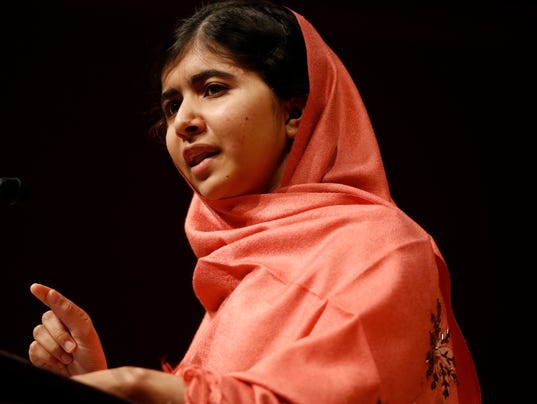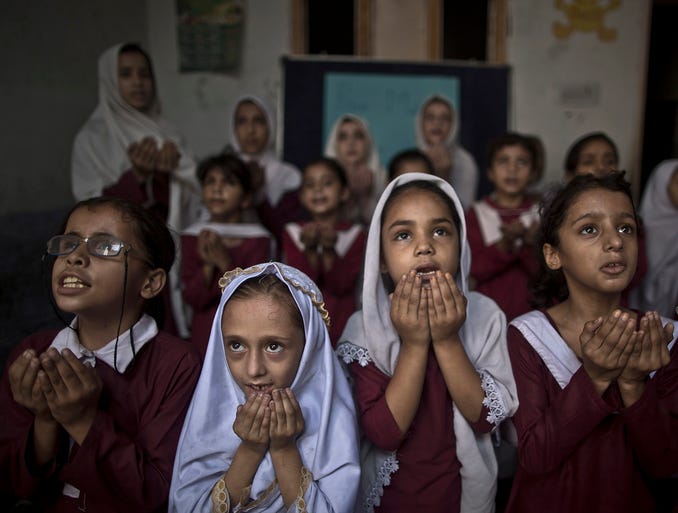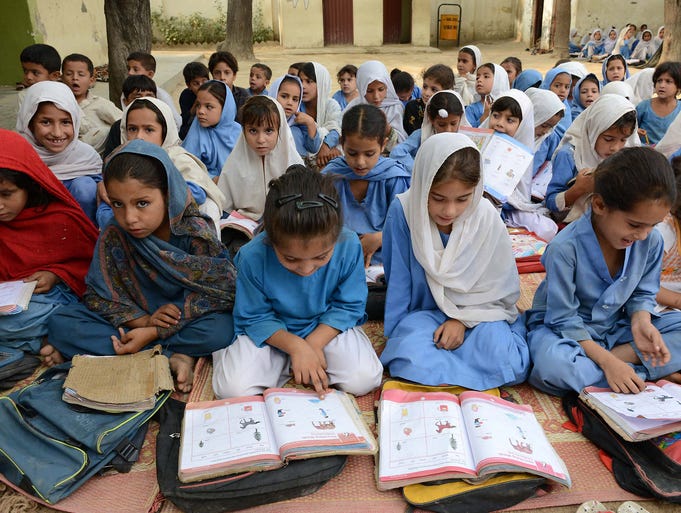M WAQAR..... "A man's ethical behavior should be based effectually on sympathy, education, and social ties; no religious basis is necessary.Man would indeed be in a poor way if he had to be restrained by fear of punishment and hope of reward after death." --Albert Einstein !!! NEWS,ARTICLES,EDITORIALS,MUSIC... Ze chi pe mayeen yum da agha pukhtunistan de.....(Liberal,Progressive,Secular World.)''Secularism is not against religion; it is the message of humanity.'' تل ده وی پثتونستآن
Thursday, October 10, 2013
Girls in Pakistan see Taliban victim Malala as heroine
Four years ago, Palwasha Yousafzai longed to go to school.
It was early 2009 and the Taliban was in control of the villages of the Swat Valley. The Islamist group had banned all types of entertainment, including television, radio and music and forbidden local women from going shopping and girls from attending school.
"Every day I would stand near the window pane and wait for an opportunity to go out of the house," recalled Palwasha, 14, now a seventh-grader at Al Razi School and College Kanju in Swat.
"I lost interest in revising my schoolwork, especially knowing that hundreds of girls' schools were already burned down and that I had little hope of going back to school," she said.
What gave her hope, she said, was a blog written anonymously by a teenage Pakistani about the trials of being a girl in a strict Muslim country. That girl, Malala Yousafzai, was attacked a year ago by the Taliban for her words, and is a candidate this year for the Nobel Peace Prize. The winner of the prize will be announced Friday.
"In that turmoil, it was (Malala's) diaries on BBC that became the voice for many girls like me," Palwasha said.
Many schoolgirls like Palwasha in Malala's home region are crossing their fingers, saying she should win, and hoping she'll do so against possible contenders such as WikiLeaks leaker Pfc. Bradley Manning and Russian President Vladimir Putin.
That's because Palwasha, who hails from a farming family, says Malala is someone who showed girls like her that they could go to school, have a future even though things seemed so bleak back when Taliban ruled the lush Swat Valley after pushing its way into power in 2007. An offensive by the Pakistan military two years later largely drove the Taliban from the area.
"In my family, women from the previous generations would help their men in the fields and not much importance would be given to their education," she said. "But now the tables have turned."Even so, there is much left to be done in the region and many local girls are hoping that if 16-year-old Malala wins the Nobel, it will raise awareness about how important it is for females to get educated: In Pakistan, only 40% of females can read.
Purkha Gul, 16, a 10th-grader at the Swat Girls Model School likens uneducated females to ticking bombs for the country. She says educating girls is key to curbing terrorism, which she calls "the biggest challenge for our country."
"We remember how the illiterate women in our neighborhood gave their jewelry to the Taliban and sacrificed their sons, brothers and husband to fight against Pakistan's army because all they could understand was that the fight was for Islam," she said.
Purkha also bitterly recounts how a friend died because she was female and local mores prevented her getting medical treatment in time.
"She died just because the doctor was a male and the family wasn't willing to get her examined," she said. "This is what lack of education can do — it can cost lives."
While Malala has been hailed internationally, some locals aren't as happy about all the attention surrounding the young activist. The Taliban this week reissued a threat against her life, which it tried to take when a Taliban terrorist shot Malala in the head in Mingora, Swat, one year ago Wednesday.
The assassination attempt as she was walking from school made headlines worldwide. Malala's father, who ran a school for girls, was allowed to bring her to England for brain surgery and to repair her face. She has remained in that country ever since.Some locals in Pakistan call Malala a "U.S. agent" and the shooting episode a mere "drama" and wonder why she gets so much attention. "Why only Malala? … Why doesn't the world cry for those children who have been killed by U.S. drone attacks?" are questions typical of many on local social-networking sites.
But analysts say that those voices are just threatened by what Malala stands for and is trying to change.
"Those who so easily buy conspiracy theories about Malala being a U.S. agent or who go against Malala are usually the same people who you will find justifying the murderous, criminal acts of the Taliban in some way, absolving them of responsibility by pointing to the U.S. invasion of Afghanistan or the drone attacks," said Beena Sarwar, a Karachi-based artist, journalist and filmmaker who focuses on human rights and gender issues.
The United States continues to target Taliban and other extremists in Pakistan with missiles fired from drones, or small unmanned planes. The U.S. military has been fighting the Taliban in Afghanistan since the Sept. 11, 2001, attacks that were orchestrated by Osama bin Laden, who was protected by the Taliban.
"These people conveniently forget that the mindset involved in the attack on Malala is the same as the one that was attacking female workers and teachers and girls' schools in the western border areas before 9/11," Sarwar said.
The Taliban has often attacked schools that teach girls, which its clerics say is forbidden by God. Some authorities have reported the possible poisoning of food in girls' schools.
"The textbooks, laws, and unofficial yet official narratives continue to promote it — and there is confusion because on the one hand Pakistan is fighting these criminals, and on the other we continue in some way or other to propagate their ideology," Sarwar said.
The Pakistani military has been accused of cooperating with the Taliban, and has in the past cut deals with its militants giving them control over territory in return for cease-fires. But it has launched offensives against it in Swat, and some here say things are getting better, though slowly.
In Mingora, Sovia Fazal, an 11th-grader at the Swat Children Academy, says her family encouraged girls' education and that she and her four sisters were treated equally with their two brothers within the family.
"My father took serious interest in educating all his daughters – I study science and my elder sister is studying medicine in Swat," she said, admitting her family is unusual in local society.
And that is why Sovia hopes Malala wins the Nobel Peace Prize — to make such opportunities the norm.
"Last year when I first heard about the assassination, I was scared for Malala," she said. "Since then, I have just prayed for her safety and it's amazing how she has become even stronger. She is brave — and there is so much to learn from her."
Subscribe to:
Post Comments (Atom)



No comments:
Post a Comment